 What Is a License Plate Reader and Can Police Track You Using It?
What Is a License Plate Reader and Can Police Track You Using It?
Table of Contents
- Alabama License Plate
- Alabama License Plate Design and Formats
- Alabama Vanity License Plate
- Most Popular Alabama Special Plate Numbers
- Alabama License Plate Lookup
- What Do I Need to Get a License Plate in Alabama?
- Differences Between a Passenger License Plate and Commercial License Plate in Alabama
- How To Renew License Plate in Alabama
- How To Transfer a License Plate in Alabama
- Alabama License Plate Lookup Frequently Asked Questions (FAQ)
 Alabama License Plate
Alabama License Plate
Alabama license plates are aluminum plates or tags that display the unique identification numbers issued to vehicles during registration. This makes it possible for the easy recognition of vehicles and their registrants. In accordance with the Code of Alabama, all motor vehicle owners operating motor vehicles within the state are required to obtain license plates or tags from the Alabama Department of Revenue (ALDOR). In Alabama, license plates are needed for vehicles like trucks, tractors, buses, motorbikes, trailers, and taxis.
The Alabama Department of Revenue issues license plates under the following categories:
- Standard License Plates: these are issued to people who buy new or used vehicles in Alabama. It can also be provided to persons who need to replace a lost, stolen, or damaged license plate.
- Military License Plates: these are issued to veterans who can show proof of service and driver's licenses with veteran designations. Additionally, a military license plate shows support for veteran programs.
- Disability License Plates and Placards: individuals with disabilities are issued placards to enable them to enjoy certain benefits, such as dedicated parking access. Furthermore, a placard is moveable from one car to another, while a disability license plate must be permanently attached to a vehicle.
- Distinctive License Plates: these are issued to individuals who wish to show support to certain organizations. Interested individuals may need to submit documents of proof that they are eligible to purchase distinctive license plates or tags.
- Vintage Vehicle License Plates: Alabama issues these license plates to vintage vehicle car owners with the intention of moving their cars to maintenance locations or to events such as parades, exhibitions, or tours.
- Collegiate License Plates: these plates are issued to individuals who want to show support for their favorite college or university.
- Personalized License Plates: Alabama issues these license plates to individuals who are interested in showing their individuality by passing a meaningful message.
A typical Alabama license plate consists of a combination of letters and numbers with the word "ALABAMA" fully displayed in between the bolt holes. The vehicle's registration sticker is in the top right corner, while Alabama's "Heart of Dixie" logo, which represents their cultural significance, can be found in the bottom right corner of the plate.
 Alabama License Plate Design and Formats
Alabama License Plate Design and Formats
An Alabama standard license plate displays a maximum of seven alpha-numeric characters. The state implemented a county code system in 1941 to identify the county where a license plate was issued. A typical license plate format begins with the county code, and may be followed by 4-6 characters. For example, license plates issued in Jefferson County begin with a number 1 prefix and may be followed by six alphanumeric characters. Lauderdale County license plates begin with the number 44, and are followed by five alphanumeric characters.
Alabama distinctive license plates have a maximum of 5-6 alphanumeric characters, depending on the quantity class. The maximum number of alpha-numeric characters allowed on quantity class 1 distinctive license plates is five, while quantity class 2 distinctive license plates can have up to six. The course supported by a distinctive license plate is usually displayed at the bottom of this type of license plate.
The Alabama Code requires that a new license plate design be issued every five years. The current standard license plate, issued in 2022, has a beach motif as the background, with the word "Alabama" displayed between the bolt holes and www.alabama.travel displayed in white beneath the number plate.
Photos of standard license plates used on passenger vehicles and motorcycles:
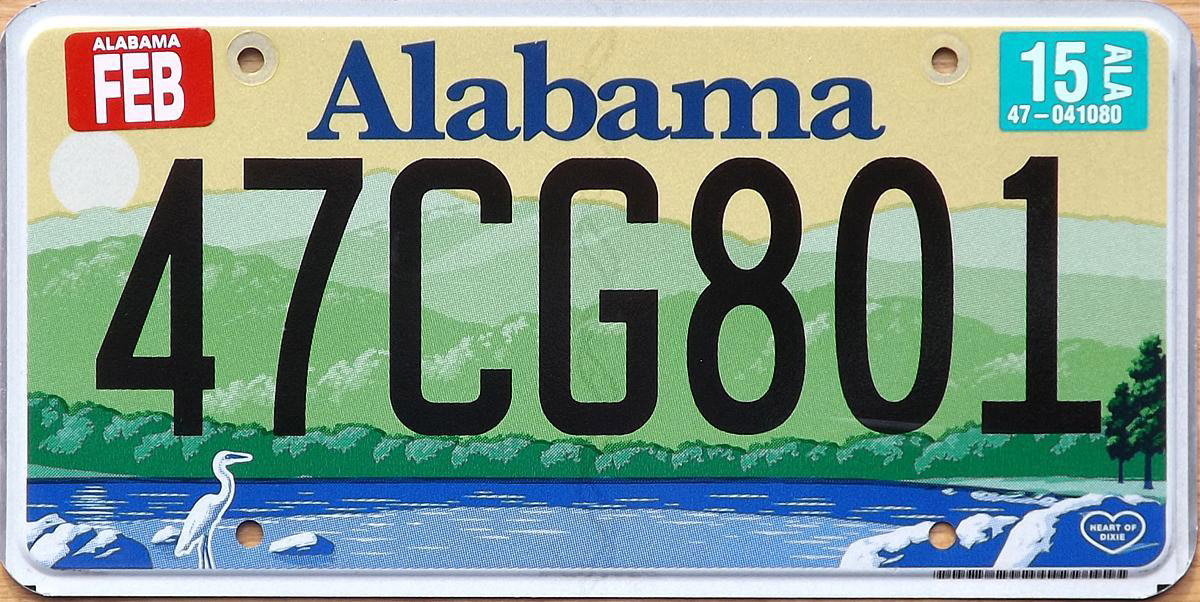
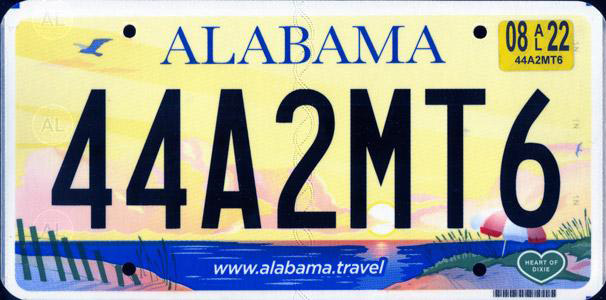
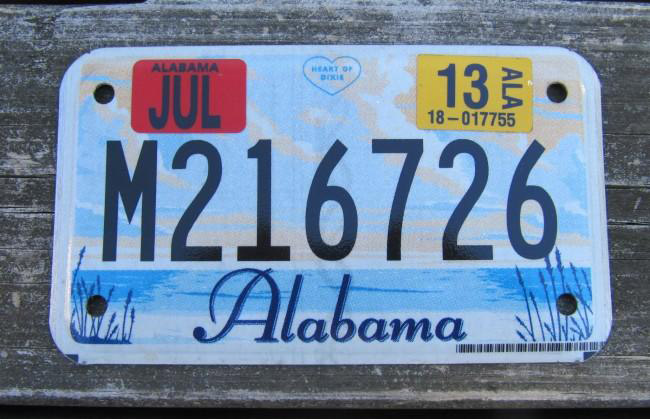
Photos of distinctive license plate formats issued to motor vehicles in Alabama:
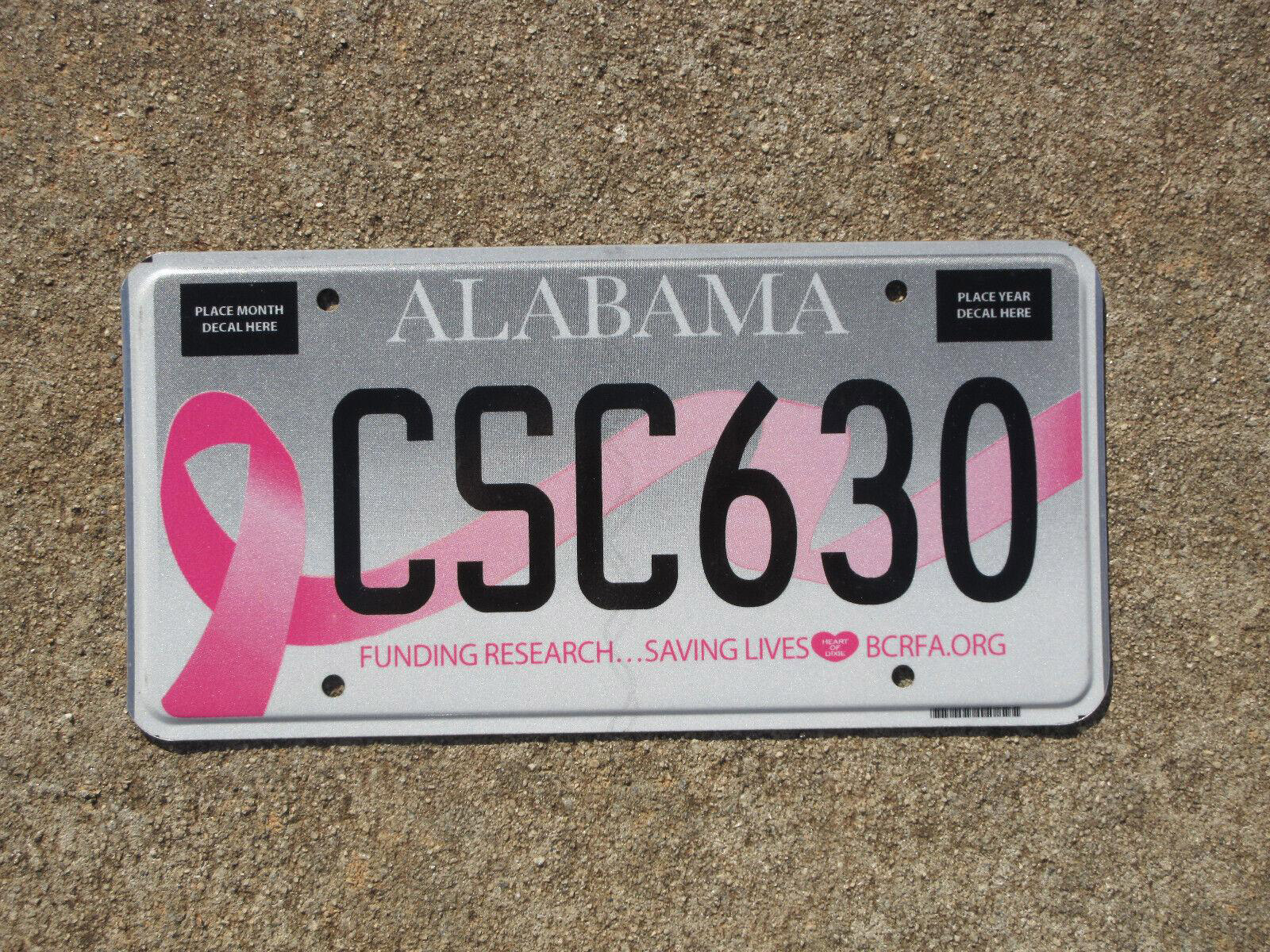
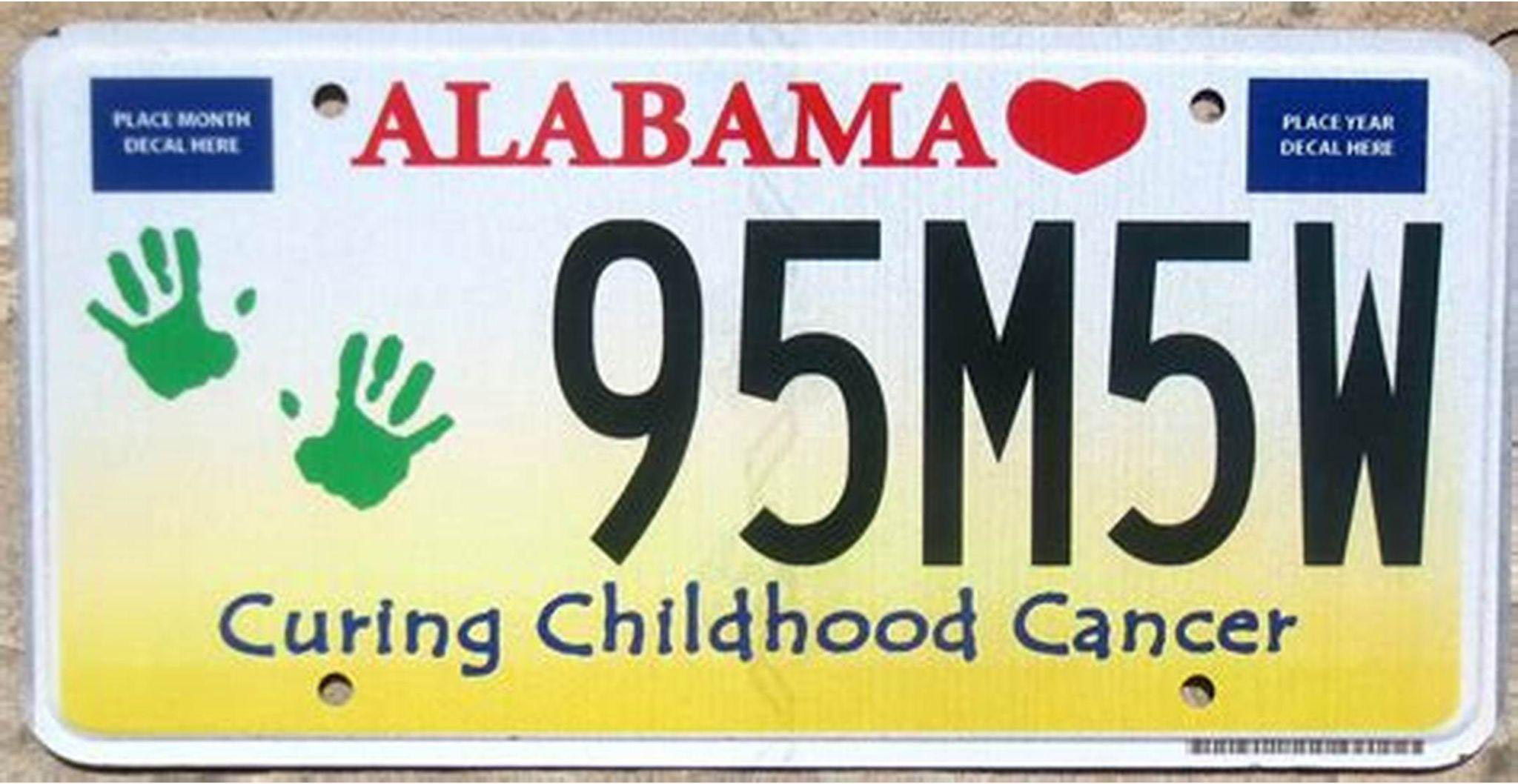
 Alabama Vanity License Plate
Alabama Vanity License Plate
Vanity license plates are customized or personalized plates or tags that contain a combination of letters and numbers chosen by a license owner to convey a unique message. In Alabama, the chosen combination must be approved by the Commissioner of the Department of Revenue before it is issued to the license owner. The Alabama Department of Revenue (ALDOR) does not disclose the number of vanity license plates they offer. However, the most prominent types are:
- Personalized License Plates: these are issued to persons who intend to showcase their individuality. It is important to note that personalized plates will only be issued to motor homes, automobiles, motorcycles, and pickup trucks that do not exceed a weight limit of 12,000lbs. A registrant interested in obtaining this type of vanity license plate must search and reserve their personalized message through the Department of Revenue Plate Reservation and Ordering System (PROS). In a case where the personalized message is available, such person must visit a license plate issuing office within five business days to pay the required fees, collect the registration receipt, a 60-days temporary license plate, and month and year decals to be placed on the new license plate. The registration fee for this license type varies from $23 to $890, depending on the type of vehicle registered, with an additional $50 for the personalized plate. The license plate will be shipped to the registrant within two to four weeks.
- Distinctive License Plates: these are usually issued to members of a specific organization and will require the registrant to provide detailed information about the organization. To obtain this type of vanity plate, a registrant must visit the Commitment to Purchase License Plate Portal to submit an application. Distinctive license plates cost between $15-$890, depending on the type of vehicle registered. Furthermore, there is a $5 fee charged for the metal plate, including an extra $5 net profit distributed to the Department. A pre-commitment redemption voucher is e-mailed to the registrant when the license is available.
 Most Popular Alabama Special Plate Numbers
Most Popular Alabama Special Plate Numbers
The most common themes of distinctive license and personalized license plates in Alabama are:
- Alabama Bicentennial plates
- Alabama Cattlemen plates
- Alabama Ducks Unlimited plates
- Alabama Forests plates
- Alabama Nurses Foundation plates
- Alabama State University plates
- Auburn University plates
- Breast Cancer Research plates
- Educator plates
- God Bless America plates
- Gold Star Family plates
- University of Alabama plates
 Alabama License Plate Lookup
Alabama License Plate Lookup
A license plate lookup entails the sourcing of key data about a vehicle using the vehicle's license plate number. It is an essential tool for verifying vehicle history such as mileage, or registration details. In addition, it ensures that a vehicle is fully compliant with the law and is free from legal issues. In Alabama, you can conduct a license plate search by contacting the Department of Revenue's Motor Vehicle Division (MVD). The Division will provide detailed information to persons who are eligible to receive records such as law enforcement officers. Alternatively, Recordsfinder and other third-party websites can provide simple information on vehicles' make and model when you perform a license plate lookup.
Alabama Reverse License Plate Number Search
Reverse license plate number search and license plate lookup are synonymous terms that refer to the process of obtaining information about vehicles through their license plate numbers. RecordsFinder offers a reliable means for conducting a reverse license plate number search while adhering to both state and federal privacy laws . Any request that violates these regulations will not be processed.
 What Do I Need to Get a License Plate in Alabama?
What Do I Need to Get a License Plate in Alabama?
The Alabama Department of Revenue, through its Motor Vehicle Division, will issue license plates to a vehicle owner who fulfills the following requirements:
- Obtain an Alabama state certificate of title (if applicable)
- Register their vehicle
- Submit the required documentation
- Pay the applicable fees
To register a vehicle in Alabama, the vehicle registrant must first receive a certificate of title from the dealer or individual from whom the vehicle was purchased. If the vehicle was purchased from an Alabama licensed vehicle dealer, the vehicle owner must submit the following documents to their local county license plate issuing office for the purpose of registering their vehicle:
- Completed certificate of title
- Bill of Sale showing the purchase price, date of purchase, sales tax, vehicle description, and VIN
- Motor vehicle dealer affidavit (applicable if vehicle was purchased from an out-of-state dealer)
- Proof of current insurance
- Valid state-issued driver's license
Registrants who purchased their vehicles from private individuals must present the following documents for registration:
- Original Certificate of Title signed by the seller
- Odometer reading (vehicles under 16,000lbs and manufactured in 2011 and newer)
- Bill of Sale
- Proof of current insurance
Registrants who have fulfilled the necessary requirements and paid the applicable fees will be issued their license plates and vehicle registration stickers.
 Differences Between a Passenger License Plate and Commercial License Plate in Alabama
Differences Between a Passenger License Plate and Commercial License Plate in Alabama
A passenger license plate is typically assigned to vehicles used for personal transportation and commuting. A commercial license plate, on the other hand, is issued to vehicles that convey goods, services, or people for compensation. In Alabama, commercial license plates are issued based on both vehicle functionality and weight. A commercial vehicle is defined in section 32-9A-1 of the code of Alabama as one with a gross weight rating or combination weight of more than 10,000 lbs. Also, the combination of a truck and trailer with a gross weight exceeding 26,000 lbs is an example of vehicles that require a commercial license plate. Besides weight, the following additional conditions may qualify a vehicle for a commercial license plate:
- Capability of transporting up to 15 passengers, driver inclusive
- It is used to carry hazardous materials that require the use of placards in compliance with the regulations of the U.S Department of Transportation
| Features | Passenger License Plate | Commercial License Plate |
|---|---|---|
| Vehicle Use |
|
|
| Number Plate Arrangement |
Single number county code:
Double number county code:
* Alabama does not have a sequential combination of numbers and letters |
|
| Design and Color |
|
|
 How To Renew License Plate in Alabama
How To Renew License Plate in Alabama
The Alabama Department of Revenue (ALDOR) renews vehicle registrations, including license plates, once a year from January through November. The state follows a staggered system to determine the specific month for vehicle registration and license plate renewal. This system assigns a particular month based on the first letter of the owner's last name in the following way:
| Month | First Letter of Last Name |
|---|---|
| January | A and D |
| February | B |
| March | C and E |
| April | F, G, and N |
| May | H and D |
| June | M and I |
| July | P and L |
| August | J, K, and R |
| September | Q, S, and T |
| October | U, V, W, X, Y, and Z |
| November | National Guard, leased, fleet and commercial vehicles |
A vehicle owner may choose to renew their vehicle registration online or in person. For online renewal, you can visit the Department of Revenue's website to view the local vehicle licensing offices that permit online renewals of license plates or tags. To ensure a successful renewal of your license plate online, you must provide the PIN issued in the renewal notice, license plate number, and renewal fees. Upon the completion of your license plate renewal, it is essential to keep the confirmation number and printed receipt until the arrival of the new vehicle license plate. Typically, new license plates and decals arrive within 3-7 business days.
For in-person renewals, you can visit your county vehicle licensing office with the following documents:
- Current vehicle registration or renewal notice
- Record number from the renewal notice
- Proof of insurance
- Renewal fees
- Valid driver's license
It is important to note that in Alabama, vehicle registration and license plates must be renewed no later than the last day of the renewal month.
 How To Transfer a License Plate in Alabama
How To Transfer a License Plate in Alabama
Alabama permits vehicle owners to transfer their license plate from one vehicle to another, provided that both vehicles fall under the same license registration classification. Furthermore, the license plate must be currently registered in the vehicle owner's name. The owner must go to their county license plate issuing office with the license tag and pay the required local issuance fee along with the state transfer fee of $1.25.
 Alabama License Plate Lookup Frequently Asked Questions (FAQ)
Alabama License Plate Lookup Frequently Asked Questions (FAQ)
Can I Get a Replacement for My Lost License Plate in Alabama?
To replace a lost license plate in Alabama, you will need to complete the Application for Replacement Credentials (Form MV 40-12-265-1) and then visit the license plate issuing office in your county. It is important to note that depending on your county, you may be required to bring a photo ID, proof of insurance, or driver's license to receive a license plate replacement. In certain counties, such as Shelby county, if you are unable to visit the license plate office yourself, you can appoint someone else to obtain the replacement on your behalf. However, it is crucial that the appointed individual correctly fills out the MVT 5-13 (Power of Attorney form) to ensure the validity of the power of attorney. The cost for a license plate replacement is $2 per plate.
What Do Police See When They Run Your License Plates in Alabama?
Under the Driver's Privacy Protection Act (DPPA), law enforcement agencies such as the police have the authority to obtain substantial information about a vehicle and its owner when they run a license plate search. Such information include:
- Vehicle details such as the VIN, make, model, and year of manufacture
- Registered vehicle owner's information
- Criminal record
- Outstanding warrant
- Current, expired, or suspended registration status
- Driver's license information
What is the Penalty for Driving with An Expired License Plate in Alabama?
In Alabama, vehicle registration and license plates are valid for one year and must be renewed latest on the last day of the designated renewal month. There is no grace period for expired registrations, and driving with an expired registration and license plate can result in impoundment and fines. Failure to register on time attracts a $15 penalty plus interest.
Alabama issues a 20-day temporary license plate for those waiting for permanent license plates. Operating a vehicle with an expired temporary license plate or tag is a misdemeanor and can lead to a fine of up to $500.
Do I Need to Return License Plates in Alabama?
The license plates of vehicles that are inoperable, stored, or unused must be surrendered to a county license issuing official within 30 days of receiving the MLI verification notice. If the license plate is not surrendered or the Request for Registration Revocation form (MV32-7A-5 ) is not completed within 30 days, the vehicle registration will be suspended. However, if a vehicle registrant is unable to surrender their license plate due to reasons listed on MV Form 32-7A-11, they may be eligible for a "good cause" extension.
Additionally, Alabama strictly prohibits the display of altered or mutilated license plates on vehicles. Therefore, vehicle registrants must surrender their mutilated license plate to the license issuing official to avoid the revocation of their registration.
If a lost license plate is found after a replacement has been ordered, it should not be displayed on another vehicle. Instead, it must be returned to the local licensing authority. Failure to do so is considered a misdemeanor and can result in a fine ranging from $25 to $100.
Can I Keep my Alabama License Plate if I Move to Another State?
A vehicle registrant who intends to move out of Alabama to another jurisdiction is not obligated to surrender their license plate to the State of Alabama. However, if a vehicle registrant still has the intention of returning to Alabama and may register their car in the future, they may surrender their license plate voluntarily prior to canceling their Alabama insurance policy to avoid Mandatory Liability Insurance (MLI) issues.
What Size are License Plates in Alabama?
The Alabama Department of Revenue issues license plates in these sizes. They are:
- License plates for trucks, pickup trucks (not exceeding 12,000lbs), motor homes, utility trailers, travel trailers, and private passenger automobiles are 6" x 12"
- Motorcycle license plates are 4"x 7"
- Validation Decals are 2.5" x 2.5"
How Long Can You Drive with Temporary License Plates in Alabama?
In Alabama, a vehicle registrant will be issued a temporary license plate and temporary registration receipt while waiting for their permanent license plates. The temporary license plate is valid for only 20 days. However, in certain circumstances, a vehicle registration may be extended up to 60 days if there is a valid reason for the delay in issuing the permanent license plate such as:
- When a licensed vehicle dealer does not provide the buyer with an owner's copy of an application for title
- When the buyer does not receive from the seller or licensed dealer the necessary documents for application of title or proof of ownership for a non-titled vehicle
Vehicles that have been permanently registered in another state can obtain a temporary license plate for up to 90 days by paying a $25 fee for each 30-day period.
What Are the Steps to Renew License Plates in Alabama?
You can renew your license plate either online or in-person in Alabama. The following steps are necessary to renew your license plate online:
- Confirm your designated month by checking the license plate/tag renewal chart on your local county vehicle licensing office website
- Select your county from the list of vehicle licensing office provided on the ALDOR website
- Search for the "renew your tag online"",renew tag online", "car or boat tag", or "tag renewal" button and select "renew an automobile"
- Input your renewal notice number
- Input your license plate number
- Pay the applicable fees
- Print and keep the receipt
It is important to note that online license tag renewal is not available in all counties. To renew your license plate in-person, you can visit your county vehicle licensing office with your renewal notice, a valid driver's license, and the applicable fees.
What Do I Do if My License Plate is Lost or Stolen in Alabama?
If your Alabama license plate is lost or stolen, you can visit your county vehicle licensing office in-person to request for a replacement. Some counties may allow you to grant another individual the power of attorney to obtain a replacement on your behalf. If you decide to visit your county's vehicle licensing office, you will be required to take the following steps:
- Complete the Application for Replacement Credentials form
- Pay the applicable fees
It is necessary to fill the MVT 5-13 form to grant your designated individual the power of attorney to obtain your license plate replacement on your behalf.




